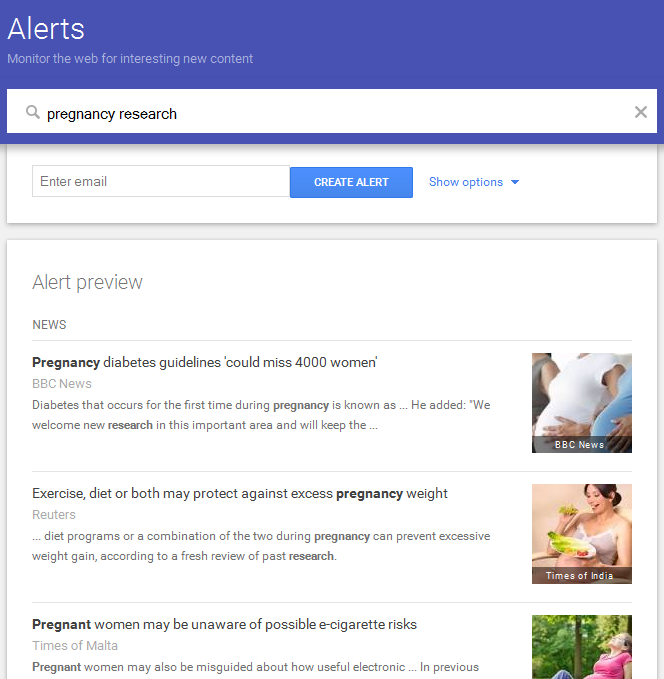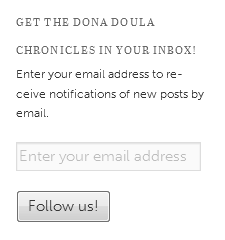There seems to be more information every day, but we certainly don’t seem to have more time to take it all in! Here are a few tips on how to stay up-to-date on information and articles related to birth and the postpartum period.
Google Alerts
 You don’t have to search the web daily to find the latest research or news articles. Search engine giant Google offers a free service that sends an email when new information on a particular topic appears on the Internet. This can be a great way to keep up with news or information in your local area or follow a subject you are very passionate about such as VBACs, pregnancy nutrition, etc. Go to http://www.google.com/alerts and type in the topic you want to receive updates on. You can choose to receive alerts on everything from the web or only news or blogs. Google also lets you set how often you want to receive emails. It’s possible to edit an alert once you’ve set it in case you aren’t getting the kind of information you want or feel you are getting too many messages. Target your alerts using quotes such as “postpartum doula” to be notified only of items that use that phrase exactly. A minus sign in an alert such as “research birth –control” can help filter out certain sub-topics that you don’t need. You can learn more about Google Alerts on their help page.
You don’t have to search the web daily to find the latest research or news articles. Search engine giant Google offers a free service that sends an email when new information on a particular topic appears on the Internet. This can be a great way to keep up with news or information in your local area or follow a subject you are very passionate about such as VBACs, pregnancy nutrition, etc. Go to http://www.google.com/alerts and type in the topic you want to receive updates on. You can choose to receive alerts on everything from the web or only news or blogs. Google also lets you set how often you want to receive emails. It’s possible to edit an alert once you’ve set it in case you aren’t getting the kind of information you want or feel you are getting too many messages. Target your alerts using quotes such as “postpartum doula” to be notified only of items that use that phrase exactly. A minus sign in an alert such as “research birth –control” can help filter out certain sub-topics that you don’t need. You can learn more about Google Alerts on their help page.
The DONA Doula Chronicles
 We try to do a good bit of the legwork for you by offering summaries of reports and protocol changes soon after they happen. We also collate several pieces of research or a collection of resources on a specific topic such as Cesarean Resources for Doulas and New Research on Premature Birth.
We try to do a good bit of the legwork for you by offering summaries of reports and protocol changes soon after they happen. We also collate several pieces of research or a collection of resources on a specific topic such as Cesarean Resources for Doulas and New Research on Premature Birth.
Tip: You don’t have to remember to check back here to get the latest posts; you can sign-up to receive posts via email to get research and resources right in your inbox.
International Doula
This quarterly print publication from DONA International covers topics in more depth than a blog or news article. Every issue includes media reviews and information specifically for doulas and the unique role we have in providing support during the childbearing year. Editions are printed in March, June, September, and December. DONA members can access back issues of the ID via the online Member Center. This is a great reference library! Issues are available back to 2011 in the Member Center.
Not currently a DONA International member? Here’s a free back issue of the International Doula to see the type and range of content included.
Trusted Resources
Part of our scope of practice as doulas is informational support. Birth doulas provide clients with “assistance in acquiring the knowledge necessary to make informed decisions about [their] care” according to the DONA International Scope of Practice. For postpartum doulas, the Scope of Practice says, “the doula offers evidence-based information.” Clearly, our role is to serve as a conduit for families to reputable information so that they can make informed decisions for their family. Determining what information is reputable, or even evidence based, can be a real challenge. To help, we’ve compiled a short list of websites that are well known in the birth community to provide evidence based information both for doulas and for the families we serve.
Childbirth Connection is a nearly 100 year old organization that recently joined forces with the National Partnership for Women & Families. Their website offers evidence-based information for families in clear, approachable language covering topics such as choosing a care provider, induction and cesareans. Pregnancy resource recommendations and information on labor support are also available. Childbirth Connection is likely a name familiar to many doulas from the Listening to Mothers surveys and the Hormonal Physiology of Childbirth report.
Lamaze’s Science & Sensibility blog provides in-depth coverage on research related to pregnancy, birth, and the postpartum period for childbirth educators, doulas and care providers. Giving Birth With Confidence,another Lamaze offering geared toward families, can be a good source of evidence-based information to share with clients. Their “Your Pregnancy Week by Week” emails are informative yet positive, which can go far to help reduce fear or anxiety in expectant moms.
The stated mission of International Cesarean Awareness Network (ICAN) is “to improve maternal-child health by preventing unnecessary cesareans through education, providing support for cesarean recovery, and promoting Vaginal Birth After Cesarean (VBAC).” Their website offers supportive and evidence based information for pregnant and parenting families through articles and blog posts. ICAN chapters can be an excellent source of support for families and an important resource for doulas.
Rebecca Dekker’s Evidence Based Birth is exactly as the name suggests – articles on birth related topics that are rooted in research. While the material here is steeped in studies and scholarly articles, the information is presented in a very approachable way. Handouts, newsletters, and even classes are also available from Evidence Based Birth that are appropriate for both doulas and families.
How else do you stay up to date? Do you have favorite resources we missed? We’d love to hear from you!
— Adrianne Gordon, CD(DONA), MBA



The Best Start Resource Centre recently released an information monitoring tool to help people stay up-to-date on information in prenatal education. The tool pulls together some of the sources you’ve mentioned above: http://www.netvibes.com/bsrcprenatal#General